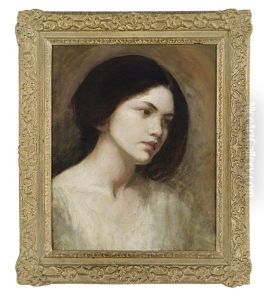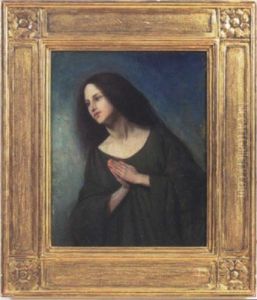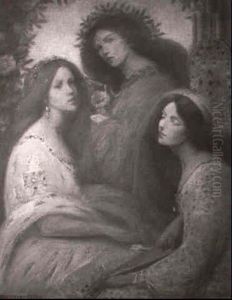Mary Lizzie Macomber Paintings
Mary Lizzie Macomber was an American painter, born on August 21, 1861, in Fall River, Massachusetts. She emerged as a significant figure in the American Pre-Raphaelite movement, known for her highly detailed, symbolic, and often mystical works. Macomber's paintings are characterized by their intricate detail, vibrant colors, and themes that frequently explore the realms of mythology, allegory, and spirituality. Her art reflects the influence of the broader Pre-Raphaelite movement, which sought to revive the detail, color, and complexity of medieval art, while also imbuing works with romantic and often spiritual themes.
Macomber received her artistic training at the Cowles Art School in Boston, where she was profoundly influenced by her instructors, particularly the American painter and photographer F. Holland Day. Day's influence is evident in Macomber's meticulous attention to detail and her interest in spiritual and allegorical subjects. Despite the challenges faced by women artists during her time, Macomber achieved considerable recognition for her work. She exhibited regularly at the Boston Art Club, the Pennsylvania Academy of the Fine Arts, and the Art Institute of Chicago, among other venues.
Her painting "St. Catherine" (1897) is considered one of her masterpieces and exemplifies her style and thematic interests. The work depicts Saint Catherine of Alexandria, surrounded by symbolic elements that allude to her wisdom and martyrdom. Macomber's portrayal of female figures often placed them in roles of spiritual or mystical significance, challenging contemporary norms and expectations of women's roles in society and art.
Despite her success, Mary Lizzie Macomber remains a somewhat obscure figure in American art history. This obscurity may be partly due to her focus on spiritual and allegorical themes at a time when the art world was moving towards realism and modernism. However, in recent years, there has been a growing interest in her work and the contributions of female artists to the Pre-Raphaelite movement and American art. Macomber's dedication to her craft and her unique vision continue to inspire a reevaluation of her place in art history.
Mary Lizzie Macomber passed away on February 4, 1916, in Boston, Massachusetts. Her legacy lives on through her contributions to the American Pre-Raphaelite movement and her role in challenging the conventions of her time. Her work is preserved in various public and private collections, offering insight into the rich tapestry of American art and the complex interplay of gender, spirituality, and artistic expression.











